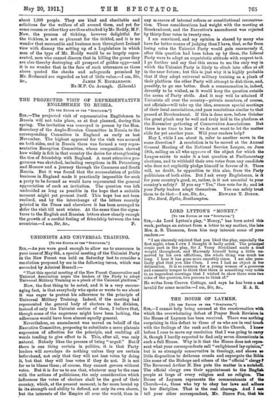UNIONISTS AND UNIVERSAL TRAINING,
[TO THE EDITOR Or THZ SPECTATOR:1
Sin,—As you were good enough to allow me to announce in your issue of May 6th, a special meeting of the Unionist Party in the New Forest was held on Saturday last to consider a res olution proposed by me in the following terms, which was seconded by Admiral Russell :— " That this special meeting of the New Forest Conservative and Unionist Association urges the leaders of the Party to adopt Universal Military Training as a plank of the Unionist platform."
Now, the first thing to be noted, and it is a very encour- aging fact, is that everybody who spoke or wrote to me about it was eager to protest his adherence to the principle of
Universal Military Training. Indeed, if the meeting had represented the general body of electors in the division, instead of only the Unionist section of them, I believe that, though some of the eagerness might have been lacking, the adherence would have been almost equally general.
Nevertheless, an amendment was moved on behalf of the Executive Committee, proposing to substitute a mere platonic expression of affection for the principle, and omitting all words tending to give effect to it. This, after all, was only natural. Nobody likes the process of being " urged." But if there is one thing certain in politics, it is that Party leaders will nowadays do nothing unless they are certain beforehand, not only that they will not lose votes by doing it, but that they will lose votes if they do not. It is not for us to blame them; of course, they cannot govern without votes. But it is for us to see that, whatever may be the case
with the actions of politicians, the only consideration which influences the votes of electors shall be the good of their country, which, at the present moment, is far more bound up in its strength and ability to defend, not only its own shores, but the interests of the Empire all over the world, than in any measure of internal reform or constitutional reconstruc- tion. These considerations had weight with the meeting at Brockenhurst, and the Executive's amendment was rejected by thirty-four votes to twenty-one.
I am convinced, and my opinion is shared by many who have far better means of judging than'I have, that, so far from losing votes the Unionist Party would gain enormously if, after this question had been taken up by them, the Liberal Party were to adopt an unpatriotic attitude with respect to it. I go further and say that this seems to me the only way in which the Unionist Party is likely to climb into office at all in the near future; but this is just why it is highly probable that if they adopt universal military training as a plank of their platform the other Party will attempt to dish them, and, possibly, to go one better. Such a consummation is, indeed, devoutly to be wished, as it would keep the question outside the arena of Party strife. And it may well be attained if Unionists all over the country—private members, of course, not officials—will take up the idea, summon special meetings of their local associations, and pass resolutions similar to that passed at Brockenhuret. If this is done now, before October the great plank may be well and truly laid in the platform at the November gathering of Conservative Associations. But there is no time to lose if we do not want to let the matter slide for yet another year. Will your readers help?
May I, while I am about it, refer to another move in the same direction P A resolution is to be moved at the Annual General Meeting of the National Service League, on June 28th, calling on all who approve of the object for which the League exists to make it a test question at Parliamentaey elections, and to withhold their own votes from any candidate who does not explicitly pledge himself in favour of it. There will, no doubt, be opposition to this also, from the Party politicians of both sides. But I ask every Englishman, is it for your country's good, or, rather, is it not essential to your country's safety? If you say "Yes," then vote for it; and let your Party leaders adapt themselves. You can safely trust them to do that.—I am, Sir, &c., EDWAED T. DIXON. The Bard, .ifythe, Southampton.








































 Previous page
Previous page